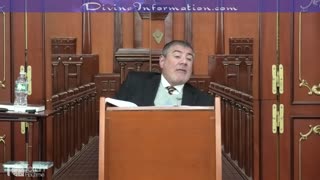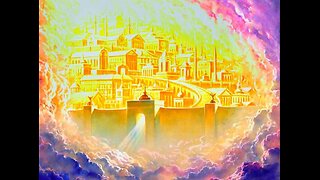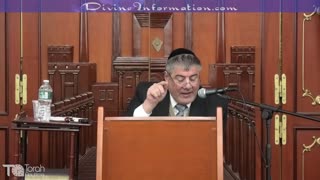Episode 1721: Have No Anxiety, All Things Are Passing, God Never Changes
If we look at the gifts of the Magi that are often associated with the Christmas story. Do we really understand what they meant and what was going on?
"On coming to the house, they saw the child with his mother Mary, and they bowed down and worshiped him. Then they opened their treasures and presented him with gifts of gold, frankincense, and myrrh."
The gifts are gold, frankincense, and myrrh. Matthew 2:11
Now what did these gift represent?
Gold: Gold is a precious metal, symbolizing wealth and kingship. The gift of gold to the baby Jesus is often seen as a recognition of his royal status.
Frankincense: Frankincense is a type of resin that is obtained from the Boswellia tree. It has been used in incense and perfumes for centuries. The gift of frankincense is often interpreted as a symbol of divinity, as it was used in religious ceremonies and signifies the spiritual nature of Jesus.
Myrrh: Myrrh is another resin obtained from trees, and like frankincense, it has been used in perfumes and incense. Myrrh also has associations with embalming and was used in the preparation of bodies for burial. The gift of myrrh is sometimes seen as a foreshadowing of Jesus's sacrificial death.
The gifts are rich in symbolism, representing aspects of Jesus's identity and mission.
Did you ever stop and consider what happened right after the Christ child was born? We hear that Matthew 2:13 literally 2 passages from the passage of the gifts.
"When they [the Magi] had gone, an angel of the Lord appeared to Joseph in a dream. 'Get up,' he said, 'take the child and his mother and escape to Egypt. Stay there until I tell you, for Herod is going to search for the child to kill him.”
Now stop and think about it. Joseph now had to get on the road and a very dangerous road from Bethlehem to Egyt. It was approximately 355 miles or approx. 2 weeks travel by foot.
Now lets consider The route from Bethlehem to Egypt during the time of Christ would have presented various challenges and dangers. The journey would have involved traversing different terrains, including deserts and possibly encountering various natural and human-made obstacles. Here are some factors to consider:
Geography and Terrain: The journey from Bethlehem to Egypt would likely have involved crossing parts of the Judean Desert. This desert is characterized by arid and harsh conditions, with challenging terrain and limited water sources. Traveling through such an environment would have been physically demanding and potentially perilous.
Bandits and Robbers: Travelers in ancient times often faced the threat of bandits and robbers along the roads and paths. The presence of valuable gifts, such as gold, frankincense, and myrrh, would have made Mary, Joseph, and the infant Jesus potential targets for robbery.
Political Unrest: The region was under Roman rule during the time of Jesus, and political instability was not uncommon. The flight to Egypt was prompted by King Herod's decree to kill all male infants in Bethlehem, an act of violence that illustrates the political dangers faced by the Holy Family.
Logistical Challenges: Navigating unfamiliar territories without modern transportation would have been logistically challenging. The journey required careful planning and reliance on available resources.
The Roman Empire, under the rule of Emperor Augustus, had control over various territories, including Egypt.
Joseph, being a resident of Judea, would have likely been familiar with Aramaic, which was a Semitic language spoken in the region. Aramaic was also a common language in the eastern part of the Roman Empire.
While the specific languages spoken by Joseph might have differed from the local languages in Egypt, the use of Greek as a common language could have facilitated communication to some extent. Additionally, Egypt had a diverse population, and various languages and dialects would have been spoken due to its cosmopolitan nature.
In practical terms, Joseph might have faced some linguistic challenges, but the prevalence of Greek and the diverse linguistic landscape of the Roman Empire would have allowed for a degree of communication. The biblical accounts, however, do not provide detailed information on how Joseph communicated during his time in Egypt.
Finding work in a new land, especially as a foreigner, could have presented challenges for Joseph during his time in Egypt. Here are some factors to consider:
Language Barrier: The language spoken in Egypt during this period was likely Greek, as it was a common language in the eastern part of the Roman Empire. If Joseph primarily spoke Aramaic or another language, there could have been a language barrier that made communication challenging. However, the use of Greek as a common language in the region might have helped to some extent.
Occupational Skills: The type of work Joseph could find might have depended on his skills and background. The Bible describes Joseph as a carpenter, and if he had expertise in carpentry, he might have sought work in construction or woodworking. However, specific details about Joseph's skills and how they translated to opportunities in Egypt are not provided in the biblical accounts.
Economic Conditions: The economic conditions of the time and the region would have influenced the availability of jobs. Egypt was an agriculturally rich area, and work related to farming or construction could have been more prevalent.
Social Integration: Joseph's ability to integrate into the local community and establish connections would have played a role in finding work. Social networks and personal connections often played a crucial role in securing employment in ancient societies.
Overall, while finding work in a new land might not have been easy, Joseph's resourcefulness and the diverse economic opportunities in a place like Egypt could have provided avenues for him to support his family.
Now lets return to the gifts the holy family received by the 3 kings at the birth of Christ.
Gold: Gold is a precious metal could it have been used as a means to support the Holy Family for a while why Jospeh found work?
Frankincense: Could this very prized material been used as a means of exchange?
Myrrh: has associations with embalming but also had other medicinal purposes. Could it have been used for the medical treatment of the Holy Family?
Now you are probably saying “what does this have to do with Have no anxiety? Would this trip let alone the time spent by the holy family in eqgpt been a source of extreme anxiety? Could you have done it? Of course it was. Joseph had to not only protect his family in a strange land but also provide. Does this not cause most fathers today huge anxiety. Would this not have caused Mary a significant anxiety taking a new born on such an arguace trip and then having to tend to the infant. Of course.
The phrase "Have no anxiety, all things are passing, God never changes"
"Therefore do not be anxious about tomorrow, for tomorrow will be anxious for itself. Sufficient for the day is its own trouble." (Matthew 6:34)
According to the Gospel of Matthew (Matthew 2:13-15, 19-23), Joseph, Mary, and the infant Jesus went to Egypt after being warned by an angel in a dream. They stayed in Egypt until Herod's death, and then, guided by another angelic message, they returned to Israel. The time frame between their arrival in Egypt and their return to Israel is not specified in the biblical accounts.
The Gospel of Matthew 2:15 quotes the prophet Hosea, saying, "Out of Egypt I called my son," emphasizing the fulfillment of a prophetic expectation.
The idea that God remains constant and unchanging is a theme in our Catholic faith. this verse is understood as an exhortation to trust in God's care and not to be overly preoccupied with worries about the future. It emphasizes the importance of living in the present moment and relying on God for guidance and sustenance.
Catholics see this teaching as an encouragement to prioritize spiritual matters and seek God's will in their lives. By focusing on the present and trusting in God's providence, believers are invited to live with faith, hope, and a sense of dependence on God rather than being consumed by unnecessary anxieties about the uncertainties of the future.
The passage is often seen as a call to simplicity, detachment from material concerns, and a reminder that God is aware of our needs. By trusting in God's care for each day, Catholics believe they can navigate life's challenges with a sense of peace and reliance on divine guidance.
St. Augustine (354–430): Augustine, in his works, often emphasized the importance of placing one's trust in God. He highlighted the idea of seeking the eternal and unchanging God rather than becoming overly concerned with temporal and passing concerns.
St. Teresa of Avila (1515–1582): St. Teresa, a Doctor of the Church, spoke about the importance of detachment and trust in God. She encouraged her followers to surrender their worries and concerns to God, focusing on the present moment and God's providence.
St. Francis de Sales (1567–1622): St. Francis de Sales, known for his teachings on the devout life, emphasized a balanced approach to life's challenges. He encouraged individuals to fulfill their daily duties faithfully while entrusting the outcomes to God.
St. Padre Pio (1887–1968): St. Padre Pio, known for his deep spirituality and mystical experiences, often spoke about the need for trust and surrender to God's will. He frequently reassured people that God's grace is sufficient for each day's challenges.
St. Thérèse of Lisieux (1873–1897): St. Thérèse, also known as the "Little Flower," advocated for a childlike trust in God. She believed in the "Little Way," a path of simplicity and humility, where individuals entrust their worries to God and rely on His love and mercy.
I want to tie back to a series I am doing on St. Teresa's spiritual classic, "The Interior Castle" (or "The Mansions"), provides insights into the progressive journey of the soul towards union with God. In this work, she emphasizes the importance of detachment from worldly concerns and surrendering to God's will. Her approach is rooted in a profound trust in God's guidance and providence.
Here are some key principles from St. Teresa's teachings that align with the theme of Matthew 6:34:
Trust in Divine Providence: St. Teresa encourages a complete trust in God's providential care. She teaches that as the soul advances in the spiritual life, it should rely more on God's grace and less on its own efforts. Trusting in God allows the soul to overcome anxiety about the future.
Living in the Present Moment: St. Teresa underscores the importance of living in the present moment and practicing mindfulness in one's spiritual journey. By focusing on the present and surrendering to God's will, individuals can experience greater peace and detachment from unnecessary worries.
Detachment from Earthly Attachments: The saint emphasizes the need for detachment from worldly possessions, honors, and anxieties. Detachment, for St. Teresa, involves a freedom of the heart from clinging to temporal things, allowing the soul to be more receptive to God's love and guidance.
Surrender to God's Will: St. Teresa's teachings emphasize the value of surrendering to God's will with humility and openness. By entrusting one's life to God and accepting whatever comes with a serene spirit, the soul can experience a deeper union with the Divine.
-
 23:39
23:39
CatholicReboot
5 months ago $0.04 earnedEpisode 1752: And his sweat became like drops of blood
404 -
 31:54
31:54
CatholicReboot
3 months agoEpisode 1938: Pilgrimage of the Soul: Navigating Faith, Reason, and Humility in Catholicism
292 -
 11:00
11:00
BlessedBeyondBelief8
4 months agoHoly Spirit make worry and anxiety a reminder for me to Seek the Kingdom of God.
90 -
 2:55:05
2:55:05
TheJewishTorah
5 months agoThe Effect of Weak Faith on Your Mental and Physical Health - Current Events
95 -
 3:40
3:40
Afriend4lif
3 months agoSt Thomas Aquinas Lenten Meditation - Friday after Ash Wednesday
11 -
 1:12:19
1:12:19
Gazowsky
3 months ago3/10/24 This is our prayer of Faith. ❤️
1653 -
 59:50
59:50
FollowerofChrist7777777
3 months agoBiblical end-time prophecies and warnings from God (part 5 of 5)
227 -
 1:19:46
1:19:46
HowToBeHealedTV with Christian Diggs
5 months ago $0.02 earnedIsaiah 61:7 - Mental Healing - Peace Of Mind Scriptures - Mental Health
109 -
 2:12:39
2:12:39
TheJewishTorah
6 months agoThis Will Change Your Entire Understanding Of Life
114 -
 4:19
4:19
Afriend4lif
3 months agoSt Thomas Aquinas' Lenten Meditation - Saturday after Ash Wednesday
15